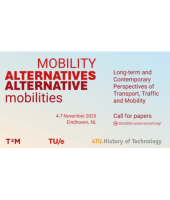2025 T2M Annual Conference
Amelia Thorpe, professor of law at the University of New South Wales (UNSW) in Sydney in Australia, and a 2025-2026 fellow-researcher at the Paris IAS City of Paris Chair), will speak on the topic of ‘Folk law and infrastructure’ at the annual conference organised by the International Association for the History of Transport, Traffic and Mobility.
Presentation
Amelia Thorpe'conference is about her research project. It will examine the interplay between formal rules and regulations, street infrastructure, and what I call ‘folk law’. Drawing on legal pluralism, legal consciousness, performativity and prefiguration, I use ‘folk law’ to describe understandings about appropriate use of streets which derive their authority not from courts or legislatures, but from custom and social acceptance. The paper focuses on Australia and North America, where my fieldwork has been conducted to date. While some cities have made progress in reducing the enormous social, economic and environmental costs of automobility, the pace of change in many Australian and North American cities has been far too slow. Frustrated by the obduracy of car-oriented street infrastructure and the laws that sustain it, the practices I study work against automobility in a range of ways. Some are deployed by activists, explicitly political and vigorously visible efforts to disrupt the status quo. Others operate in a different register, engaging not as activists but as commuters and commercial cyclists making do. Despite their very different approaches to politics and publicity, these practices are comparable in their use of objects and bodies to enact (at least temporarily) alternative, more just and sustainable mobilities. Analysis of these practices shows that infrastructure and legality are deeply entangled, and that ‘folk law’ can be more important than formal law in shaping how streets are used and understood. What makes these practices especially hopeful, I argue, is their attention to folk legality and their potential to disrupt it.
Full program
Conditions of participation
Event on site. Open to the public, registration required and fee applies
More information
|
|
|
Democratic infrastructures 01 September 2025 - 30 June 2026 |
|
|

